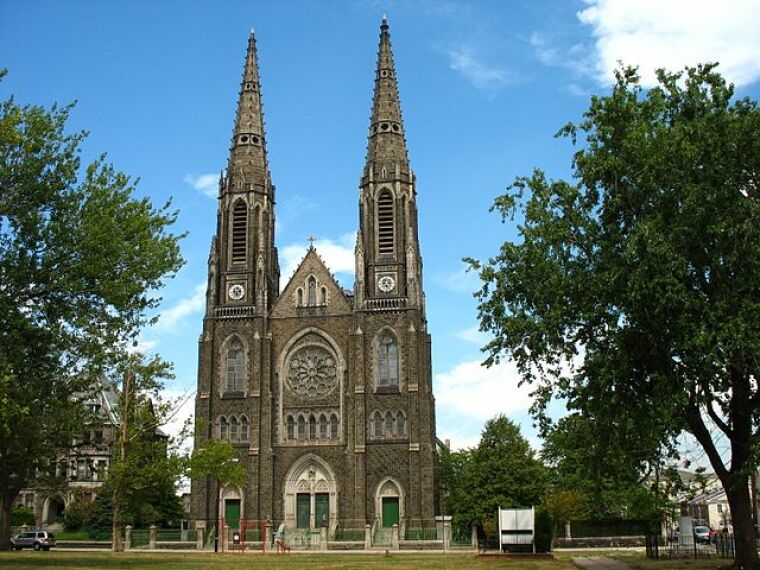New Jersey SC hears challenge to grant scheme for preservation of historic churches

The New Jersey Supreme Court has begun to hear the arguments in the case challenging the preservation grant scheme that allows historic churches in the state to receive taxpayer funds to fix damages to their buildings.
Seven historic churches in New Jersey headed to the state's high court on Monday to present their arguments that they should be included in an award of $2.9 million in grants to help preserve 25 historic sites.
In 2015, the Wisconsin-based Freedom From Religion Foundation (FFRF) filed a lawsuit to challenge the practice of awarding grants to historic churches for restoration or repairs, arguing that it is a violation of the state Constitution.
In January, a Somerset County Superior Court judge upheld the grant scheme, prompting the FFRF to appeal to the state Supreme Court.
Despite the lawsuit, a review board recommended to Morris County freeholders that the seven historic churches be included in the preservation grant scheme.
"These preservation funds, overwhelmingly approved by county taxpayers, help finance the protection our county's heritage, to ensure that we maintain important links to our past," Freeholder Director Doug Cabana said in a statement about the recommendation in July.
At the hearing on Monday, Chief Justice Stuart Rabner said that the text of New Jersey Constitution made it clear that taxes cannot be used to build or repair churches.
"How is this not a repair?" Rabner asked, adding that the difference between repairs and historical preservation appear to be mere semantics.
Ken Wilbur, an attorney for the grant-recipient churches, contended that "repair is a different concept than preservation."
"The government here is not spending its money to benefit religion, it is spending its money to benefit the public," Wilbur said, according to Courthouse News.
John Bowens, who represents Morris County, argued that the local governments overseeing the grants make sure that the money is spent on preservation rather than interior repairs.
He acknowledged that the grants were used to pay for plumbing and mechanical repairs, as well as repairs to stained-glass windows in two cases. But he argued that none of the grants were used to pay for the interior repairs for the churches.
Several of the justices pointed to the U.S. Supreme Court ruling in the case Trinity Lutheran Church v. Comer, in which the court held 7-2 that churches can receive state money for secular purposes, particularly those that promote the public welfare.
Wilbur argued that the ruling requires New Jersey to uphold the grant scheme, adding that the state is participating in a neutral public welfare program by preserving a historic building.
However, Alex Luchenitser, associate legal director for Americans United for Separation of Church and State, argued that the problem with the Trinity Lutheran decision is that mixed-use religious buildings, such as a church basement that can sometimes be used as a soup kitchen, could not receive state funds.
Courthouse News noted that about $850,000 out of $2.9 million in state grants were approved for six places of worship in July 2017.
The grant recommendations made by the review board to the Morris County Board of Freeholders in Morristown include $2,746 for the Women's Club of Morristown headquarters building and $283,560 for the South Street Presbyterian Church in Morristown. The money reportedly comes from the voter-approved Morris County Open Space, Farmland, Floodplain Protection and Historic Preservation Trust Fund.
 Christians don't have to affirm transgenderism, but they can’t express that view at work: tribunal
Christians don't have to affirm transgenderism, but they can’t express that view at work: tribunal Archaeology discovery: Medieval Christian prayer beads found on Holy Island
Archaeology discovery: Medieval Christian prayer beads found on Holy Island Presbyterian Church in America votes to leave National Association of Evangelicals
Presbyterian Church in America votes to leave National Association of Evangelicals Over 50 killed in 'vile and satanic' attack at Nigerian church on Pentecost Sunday
Over 50 killed in 'vile and satanic' attack at Nigerian church on Pentecost Sunday Ukrainian Orthodox Church severs ties with Moscow over Patriarch Kirill's support for Putin's war
Ukrainian Orthodox Church severs ties with Moscow over Patriarch Kirill's support for Putin's war Islamic State kills 20 Nigerian Christians as revenge for US airstrike
Islamic State kills 20 Nigerian Christians as revenge for US airstrike Man who served 33 years in prison for murder leads inmates to Christ
Man who served 33 years in prison for murder leads inmates to Christ


 Nigerian student beaten to death, body burned over ‘blasphemous’ WhatsApp message
Nigerian student beaten to death, body burned over ‘blasphemous’ WhatsApp message 'A new low': World reacts after Hong Kong arrests 90-year-old Cardinal Joseph Zen
'A new low': World reacts after Hong Kong arrests 90-year-old Cardinal Joseph Zen Iran sentences Christian man to 10 years in prison for hosting house church worship gathering
Iran sentences Christian man to 10 years in prison for hosting house church worship gathering French Guyana: Pastor shot dead, church set on fire after meeting delegation of Evangelicals
French Guyana: Pastor shot dead, church set on fire after meeting delegation of Evangelicals ‘Talking Jesus’ report finds only 6% of UK adults identify as practicing Christians
‘Talking Jesus’ report finds only 6% of UK adults identify as practicing Christians Mission Eurasia ministry center blown up in Ukraine, hundreds of Bibles destroyed: 'God will provide'
Mission Eurasia ministry center blown up in Ukraine, hundreds of Bibles destroyed: 'God will provide' Church holds service for first time after ISIS desecrated it 8 years ago
Church holds service for first time after ISIS desecrated it 8 years ago Burger King apologizes for 'offensive campaign' using Jesus' words at the Last Supper
Burger King apologizes for 'offensive campaign' using Jesus' words at the Last Supper Uganda: Muslims abduct teacher, burn him inside mosque for praying in Christ’s name
Uganda: Muslims abduct teacher, burn him inside mosque for praying in Christ’s name